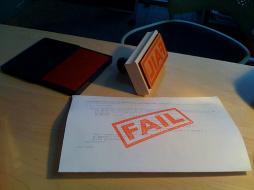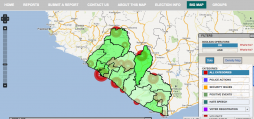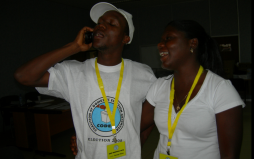ndi
Posted by AnneryanHeatwole on Dec 16, 2011
FailFaire – where it's okay to admit the mistakes. MobileActive hosted another round of FailFaire, bringing together practitioners, developers, donors, and students involved in the use of technology for social change development to discuss what's usually swept under the rug – project failure. The event is an open space to discuss those projects that went wrong in our field fostering a sense of learning from mistakes and knowledge sharing. The latest FailFaire in New York brought together eight practitioners to present their failed projects and what they learned along the way. Take a look at this FastCompany article about the NYC FailFaire for some background.
So, here we bring you...
Posted by AnneryanHeatwole on Dec 03, 2011
On November 8, 2011, the Liberian President Ellen Johnson Sirleaf won her re-election campaign following a contentious runoff vote. In the October 11 general election, neither of the top two presidential candidates secured a majority vote –Johnson Sirleaf received 43.9% of votes and opposition candidate Winston Tubman received 32.7% of the nation’s votes. Johnson Sirleaf and Tubman were scheduled to participate in a November 8 runoff election; however, Tubman boycotted it saying that the first elections had been unfair; a claim international election observers dispute. As the only candidate, Sirleaf won the runoff despite a low 37.4% of eligible voters coming out for the second round (compared to more than 70% for the first round).
In light of the election’s tumult, MobileActive.org spoke to the National Democratic Institute and Ushahidi Liberia to learn more about their respective work in the country encouraging transparency and fairness through election monitoring and citizen reporting.
The National Democratic Institute and Ushahidi in the 2011 Liberian Elections
Elections can be rigged in many ways, and voter fraud is varied. For instance, ballots can be changed or manipulated, voters can be influenced through intimidation or bribes, violence can shut down polling stations, or ballots can be changed after the election before the results are announced. Technical difficulties can also influence an election by preventing voters from casting their votes or having those votes accurately counted; difficulties could include long lines, failure to open a polling place on time, or a lack of necessary supplies.
| Technology in the 2011 Liberian Elections: Mobiles, Monitoring, and Mapping data sheet 3010 Views |
| Countries: |
Liberia
|
Posted by MelissaUlbricht on Apr 27, 2011
One of the largest parallel vote tabulation efforts is under way right now in Nigeria to observe and monitor gubernatorial elections. Project 2011 Swift Count is observing the national assembly, state assembly, and gubernatorial elections with 8000 trained election observers. The observers are also working across six high-priority states to complete parallel vote tabulations to verify the official results in six corresponding gubernatorial elections.
At around 9pm in Nigeria on election day, MobileActive.org spoke with Chris Doten, senior program officer on the ICT team for the National Democratic Institute (NDI). When we spoke with Doten, two-thirds of trained election observers had sent in via text message final vote counts, meaning the final tallying was complete at that particular polling place. A much higher percentage of observers have sent in summaries of total ballots cast.
| 8000 Observers Report on Nigerian Elections via Text Message data sheet 3968 Views |
| Global Regions: |
|
| Countries: |
Nigeria
|
Posted by admin on May 31, 2010
Recently, we’ve been seeing a lot of hype about citizen reporting with mobile phones during elections. It is often conflated with the term “election monitoring,” but this does a disservice to both citizen reporting and election monitoring, a discipline and field that has been around for some 20 years. These two approaches have markedly different goals, target audiences, and processes. We think it is time for readers to definitively understand what election monitoring is in contrast to citizen reporting, and what the role of mobile phone and mapping platforms are in regard to these two very different forms of engagement during elections. We aim to clearly differentiate between them once and for all.
We also urge the adoption of differing terms - citizen reporting during an election versus systematic election monitoring. Mobile phones, SMS, and mapping platforms play a role in both citizen reporting and election monitoring, of course.
Posted by AnneryanHeatwole on Feb 08, 2010
The National Democratic Institute and MobileActive.org are hosting "New Tools for Better Elections", a conference on February 26th on new technologies for fair, representative and equitable elections. In preparation for the event, we sat down with Ian Schuler, Senior Manager of Information and Communications Technology Programs at the National Democratic Institute. Schuler specializes in the application of mobile technology for the advancement of democracy and human rights, He is the author of SMS as a Tool in Election Observation.
In this conversation, Schuler breaks down not only the differences between election observation, citizen reporting, and crowd-sourcing, but also explains why these distinctions matter and how mobile technology is changing the way elections are held. Read on for excerpts from our conversation, or scroll down to watch the interview in its entirety.
Q: You and NDI have done a lot of election monitoring around the world. Explain why election monitoring matters.
A: Elections are the main process by which people participate in their government by selecting their leaders. People expect that it’s going to be a fair process, and that it’s going to be an accurate process. So it’s important for people to have confidence to know that somebody is really systematically watching the entire process to make sure that it is good. Election monitoring prevents fraud by making it harder for the people who want to manipulate elections to do so; it detects fraud when it happens, and it lets people know if the process was good – and if it was not, what were the problems and what might be constructive, non-violent ways of remedying those problems, whether it’s simply improving the process for later or rerunning elections or whatever is warranted in that situation.



